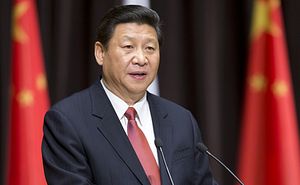China’s new central Internet security and informatization leading group met for the first time on Thursday, with President Xi Jinping himself heading up the meeting. Premier Li Keqiang is also a member of the group. The leading group will focus on cyber issues in all its aspects, including economic , political, cultural, and even military issues. According to Xinhua, Xi Jinping told the group that “Internet security and informatization is a major strategic issue concerning a country’s security and development as well as people’s life and work.”
There was extensive coverage on the meeting on the Chinese-language website of Xinhua, China’s state news agency. The major report called the new group “an important step” in creating a national strategy for China’s cybersecurity and informatization. The article pointed out that being a “big Internet country” (having a large internet-using population) has not yet translated into China being a “powerful Internet country.” To achieve this goal, Xi called for a dual focus on developing technology and ensuring cybersecurity. These two aspects, Xi said in his speech [Chinese], are “two wings of a bird” and require an overall plan to advance both simultaneously.
In terms of technology, there is still a large gap between urban and rural residents when it comes to internet access. Of China’s 618 million Internet users, only 28.6 percent live in rural areas (even though overall nearly 48 percent of Chinese citizens live outside of cities). Plans to narrow this “digital gap” will fit in well with China’s overall reform plan, which calls for increased investment in rural areas and a stepped-up urbanization campaign.
Xinhua [Chinese] also pointed to a lack of Chinese innovation as an area for potential improvement. The new leading group is expected to put forth policies that will support the development of IT enterprises. To be a cyber power, Xi said, China must have “its own technology” and first-rate technology. Look for China’s government to continue to emphasize domestic innovations, particularly in the IT field as its seek to fulfill those goals.
As for cybersecurity, China has repeatedly said that it is a major victim of cyber attacks. Xinhua pointed out that last year nearly 900,000 individual IP addresses suffered attacks from foreign Trojan horse viruses or zombie programs. Yet until now, responsibilities for China’s cybersecurity had been divided among different departments, hampering effectiveness. The new group, headed by Xi himself, is expected to streamline things by providing top-level guidance. Xinhua compared the leading group’s establishment to other precedents, including America’s February 2014 “Cybersecurity Framework” and Japan’s June 2013 “Cybersecurity Strategy.” The new group is designed to “establish a strong and authoritative mechanism at the central level” to deal with China’s cybersecurity. It’s a sign that China is taking the problem of cybersecurity very seriously, and, as Xi said, views cybersecurity as an essential prerequisite for overall security.
In additional to external threats, however, the CPC remains concerned with controlling the domestic content of China’s Internet. The reports of the leading group’s meeting made it clear that campaigns against internet rumors and obscene material will not only continue, but will intensify. While in theory these campaigns are designed to eliminate slander and pornography, it’s hardly a secret that censors also remove information they believe might be harmful to China’s stability, whether that means commemorations of the Tiananmen Square crackdown of 1989 or rumors about the corruption of a Party official. As a result, Freedom House had China tied with Cuba for 58th out of 60 countries in its “Freedom on the Net 2013” report, ahead of only Iran.
Xi’s speech made it clear that the CPC envisions an internet that will nurture “socialism’s core values.” Xi called for the Party to continue to the work of molding online public opinion — the process of “making cyberspace clean and bright.” In other words, China’s “Great Firewall” isn’t going anywhere.

































